When you buy a camper, you’re expecting to get all necessary paperwork to complete, including a title. What if your camper doesn’t have a title? Knowing how to get a title for a camper without a title can be a bit confusing if you’ve never done it, but all it takes is a little preparation.
Getting a title for a camper without a title is as easy as visiting your local Department of Motor Vehicles (DMV) and preseningt the necessary paperwork and fees. Some states offer a mail-in option, but it is important to check with the DMV first. In addition to the application form, a copy of the driver’s license may also be required. Another option is to obtain a bonded title, which involves purchasing a bond that guarantees the ownership of the camper. This process varies by state and may require additional documentation.
We’ll go over everything you need to know about getting a title for an untitled camper in this guide.
How To Get A Title For A Camper Without A Title
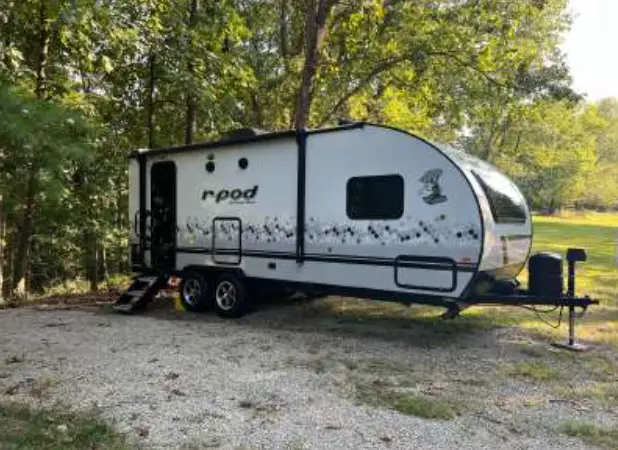
When it comes to owning a camper or RV, having a title is essential. It serves as legal proof of ownership and allows you to sell or transfer ownership of the vehicle.
If you have purchased a camper without a title or have lost the title, getting a new one can seem like a daunting task.
Fortunately, there are several ways to obtain a title for a camper without a title. The process may vary depending on the state you live in, but here are some general steps to follow:
- Contact the DMV: The Department of Motor Vehicles (DMV) is responsible for issuing titles in most states. Contact your local DMV to find out what documents you need to provide and what fees you need to pay to obtain a new title.
- Provide Proof of Ownership: In order to obtain a new title, you will need to provide proof of ownership. This can include a bill of sale, registration documents, or any other documents that prove you are the rightful owner of the camper.
- Get a VIN Inspection: A Vehicle Identification Number (VIN) inspection may be required to verify that the camper is not stolen and to ensure that the VIN matches the vehicle. Contact your local law enforcement agency or DMV to schedule a VIN inspection.
- Apply for a Bonded Title: If you are unable to provide proof of ownership, you may be able to apply for a bonded title. This involves purchasing a surety bond that guarantees the ownership of the vehicle. If the ownership is ever disputed, the bond will cover any financial losses.
- Consider a Title Service: If you are having difficulty obtaining a title on your own, you may want to consider using a title service. These companies specialize in helping individuals obtain titles for vehicles that have lost or missing titles.
In short, obtaining a title for a camper without a title may require some effort, but it is possible. By following the steps outlined above and working with your local DMV, you can obtain a new title and legally prove ownership of your camper or RV.
Do All RVs And Campers Need A Title?
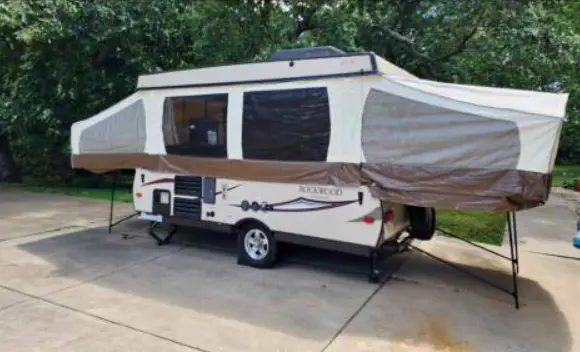
In most states, all RVs and campers need a title. A title is a legal document that proves ownership of the vehicle. It is required for registration, insurance, and other legal purposes. Without a title, it can be challenging to sell or transfer ownership of the vehicle.
The requirements for getting a title for an RV or camper vary by state. Some states may require a title for all RVs and campers, while others may only require a title for vehicles that are a certain age or meet certain criteria. It is essential to check with your local DMV to determine the specific requirements in your state.
In addition to a title, some states may also require other documents, such as a bill of sale, certificate of inspection, or proof of lien status. It is crucial to gather all the necessary documents before applying for a title to avoid any delays or complications.
It is essential to ensure that you have a title for your RV or camper to avoid any legal issues. If you are unsure about the requirements in your state, it is always best to check with your local DMV to ensure that you have all the necessary documents.
Why A Camper Or RV Is Missing A Title
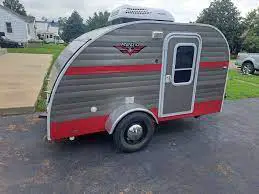
When you purchase a camper or RV without a title, it can be a frustrating experience.
It’s important to understand that there are several reasons why a camper or RV may not have a title. In this section, we’ll explore some of the most common reasons why a camper or RV is missing a title.
The Title Is Lost
One of the most common reasons why a camper or RV is missing a title is that the title has been lost. This can happen for a variety of reasons, such as the previous owner misplacing or losing the title, or the title being destroyed in a fire or flood.
In some cases, the title may have been transferred to another state or country, and the current owner is unaware of this.
The Camper Or RV Is Stolen
Another reason why a camper or RV may not have a title is that it has been stolen. In some cases, the thief may have sold the camper or RV to an unsuspecting buyer, who then discovers that the title is missing.
If you suspect that the camper or RV you are considering purchasing may be stolen, it’s important to contact the authorities and have them run a VIN check before you make any purchase.
The Camper Was Self-Built Or From A Kit
If the camper or RV was self-built or from a kit, it may not have a title. In these cases, the owner may need to provide documentation that proves that the camper or RV was built in compliance with local laws and regulations.
This may include receipts for materials, photos of the build process, and other documentation.
It’s A Collectible Or Vintage Camper With No Original Title
Finally, if the camper or RV is a collectible or vintage model, it may not have an original title. In these cases, the owner may need to apply for a replacement title or work with a title company to obtain a new title.
It’s important to note that the process for obtaining a replacement title for a vintage or collectible camper or RV can be more complicated than for a newer model, so it’s important to do your research and work with a reputable company.
Why Are Camper Titles Required?
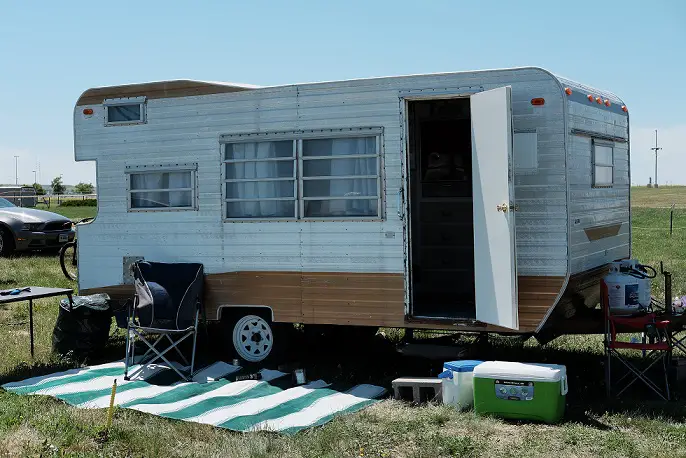
In most states, campers are considered vehicles and require a title to legally operate on public roads. The title serves as proof of ownership and allows the owner to register the camper with the Department of Motor Vehicles (DMV).
Without a title, it may be difficult to get insurance, pay property taxes, or obtain financing for the camper.
When a camper is sold or transferred, the title must be signed over to the new owner. This ensures that the new owner has legal ownership of the camper and can register it with the DMV.
If a camper is purchased without a title, the new owner may need to obtain a bonded title or apply for a title through a state’s abandoned vehicle process.
In some states, campers that are over a certain age, typically 30 years, are not required to have a title. These campers may be considered vintage or collector items and may have different registration requirements.
Camper Title Application Process
Getting a title for a camper without a title can be a bit of a challenge, but it is not impossible. Here are the steps to follow when applying for a title for your camper.
Step 1: Gather Necessary Documents
Before you can apply for a title for your camper, you will need to gather some important documents. These documents include a bill of sale, a certificate of origin, and a copy of your driver’s license. If you are transferring ownership, you will also need the original title to the vehicle.
Step 2: Fill Out A Title Application From Your State’s DMV Website
Once you have all the necessary documents, you will need to fill out a title application from your state’s DMV website. Be sure to fill out all the required fields accurately. If you are unsure about any of the information, contact your DMV for assistance.
Step 3: Submit The Title Application Fee To Your DMV
After filling out the application, you will need to submit the title application fee to your DMV. The fee varies depending on the state you live in, so be sure to check with your DMV for the exact amount.
What Info Will I Need For The RV Title Application?
When filling out the RV title application, you will need to provide some basic information about the vehicle. This information includes the:
- Make
- Model
- Year
- Vehicle identification number (VIN)
You may also need to provide information about any liens on the vehicle.
What Info Do I Need On A Camper or RV Bill Of Sale?
When creating a bill of sale for your camper or RV, you will need to include some important information. This includes:
- The buyer and seller’s names and addresses
- The purchase price of the camper or RV
- The date of sale
- Description of the vehicle
Be sure to include as much detail as possible to avoid any confusion or misunderstandings.
By following these steps and providing all the necessary information, you can successfully apply for a title for your camper without a title.
Certificate of Inspection and Safety Measures

Arranging for Inspection
To obtain a title for a camper without a title, a certificate of inspection is often required. This inspection ensures that the camper is roadworthy and meets safety standards. The inspection is usually conducted by a licensed mechanic or an authorized inspection station.
To arrange for an inspection, the owner of the camper should contact their local DMV or check their state’s DMV website for information on inspection requirements. The DMV will provide a list of approved inspection stations where the inspection can be conducted.
It is important to note that some states require the inspection to be completed before a new title can be issued. Therefore, it is essential to arrange for the inspection as soon as possible.
What Does the DMV Check on a Camper Safety Inspection?
During a safety inspection, the DMV will check various components of the camper to ensure that it meets safety standards. Some of the areas that are usually inspected include:
- Brakes: The brakes must be in good condition and work correctly.
- Lights: All lights, including turn signals, brake lights, and headlights, must be in working order.
- Tires: The tires must have sufficient tread depth and be free from damage.
- Suspension: The suspension must be in good condition and free from damage.
- Windshield and Windows: The windshield and windows must be free from cracks or other damage that could impair the driver’s vision.
- Exhaust System: The exhaust system must be free from leaks and meet noise standards.
If the camper fails the inspection, the owner will need to have the necessary repairs made before it can pass the inspection and receive a certificate of inspection. Once the camper passes the inspection, the owner can then apply for a new title with the DMV.
Obtaining a certificate of inspection is an essential step in obtaining a title for a camper without a title. By ensuring that the camper meets safety standards, the owner can rest assured that the camper is roadworthy and legal to operate.
Dealing with Liens
Understanding Lien Status
Liens are legal claims that creditors have on a property, such as a camper, until the debt is paid off. If the camper you are trying to get a title for has a lien on it, it means that the previous owner still owes money on it. Understanding the lien status of a camper is crucial in the process of getting a title for it.
To find out if there is a lien on the camper, you will need to obtain a lien status document from the previous owner. This document will show you the name of the lienholder, the amount owed, and the date the lien was placed on the camper.
It is important to note that you cannot get a title for a camper with a lien until the lien is cleared.
Clearing a Lien
Clearing a lien can be a complicated process, but it is necessary to get a title for a camper with a lien. The first step is to contact the lienholder and find out the exact amount owed. Once you have this information, you will need to pay off the debt in full.
After the debt is paid off, the lienholder will issue a lien release document. This document will need to be submitted to the DMV along with the other required documents to get a title for the camper.
If you are buying a camper with a lien, it is important to ensure that the lien is cleared before you make the purchase. You can do this by obtaining a lien release document from the previous owner.
When selling a camper with a lien, the seller should disclose the lien information to the buyer and provide a lien release document once the debt is paid off.
Buying from Different Sellers
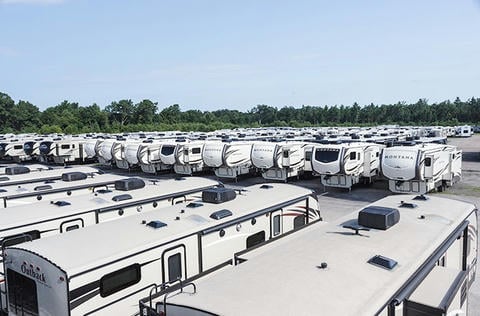
When it comes to purchasing a camper without a title, there are different sellers you may encounter. It’s important to know the differences between buying from a dealer and buying from a private seller.
See Related: RV Sales Tax By State & RV Lemon Laws By State
Buying from a Dealer
If you decide to purchase a camper from a dealership, you may have a better chance of obtaining a title. Dealerships often have access to records and can assist with obtaining a title for the camper. Keep in mind that dealerships may charge a higher price for these services.
When purchasing from a dealership, it’s important to ask for the vehicle’s history report. This report will provide information about the camper’s previous owners, any accidents, and other important details.
Dealerships may also offer financing options, which can be helpful if you’re unable to pay for the camper upfront.
Buying from a Private Seller
Buying from a private seller can be a bit trickier, but it’s still possible to obtain a title. Private sellers may not have access to the necessary paperwork, so it’s important to do your research and be prepared to take additional steps to obtain a title.
When purchasing from a private seller, it’s important to ask for any documentation they have for the camper. This can include the bill of sale, registration, and any other paperwork related to the camper.
If the seller doesn’t have the title, you may need to contact the DMV to find out what steps you need to take to obtain one.
It’s also important to verify the seller’s identity and ensure that they are the rightful owner of the camper. This can be done by checking the registration and asking for identification.
Regardless of whether you’re buying from a dealer or a private seller, it’s important to do your due diligence and ensure that you’re getting a good deal.
Take the time to research the make and model of the camper, as well as the average price range. Don’t be afraid to negotiate with the seller to get a fair price..
Special Cases
Dealing with Vintage or Collector Items
When it comes to vintage or collector campers, it can be challenging to obtain a title. Sometimes these unique pieces don’t have a title or any documentation at all. In such cases, the first step is to research the camper’s history and try to find any information about its previous owners.
If the camper is rare or valuable, it may be worth investing in a professional title search service. These services can help find any missing documentation and provide a clear title in your name.
Another option is to apply for a bonded title. This process involves purchasing a surety bond that guarantees you are the rightful owner of the camper.
If any previous owner comes forward with a claim, the bond will cover their losses. Once you have the bond, you can apply for a title with your state DMV.
Handling Inherited Campers
If you’ve inherited a camper from a family member, obtaining a title may seem daunting. The process can vary depending on the state, but generally, you’ll need to provide proof of ownership, such as a will or a letter from the executor of the estate.
If the camper was not included in the will or the estate is intestate, meaning there was no will, you’ll need to go through the probate process. This process can take several months and can be expensive, so it’s essential to plan accordingly.
What About Abandoned Campers?
If you’ve come across an abandoned camper, you may be able to obtain a title through a process called a mechanic’s lien. This process involves storing the camper for a certain amount of time, usually 30 days, and then filing a lien against it.
Once the lien is in place, you can apply for a title with your state DMV. Keep in mind that this process can be complicated and time-consuming, so it’s essential to follow the correct legal procedures.
Legal Issues and Troubles
Avoiding Stolen Campers
One of the legal issues that can arise when trying to get a title for a camper without a title is the possibility of dealing with a stolen camper. It is important to be cautious when purchasing a camper without a title and to take steps to avoid purchasing a stolen camper. This can include:
- Checking the camper’s VIN number to ensure that it matches the number on the title, registration, and any other paperwork.
- Researching the camper’s history to see if it has been reported stolen or if there are any liens on it.
- Asking the seller for proof of ownership, such as a bill of sale or previous registration documents.
By taking these steps, individuals can avoid legal troubles and potential fines associated with purchasing a stolen camper.
Facing Penalties and Fines
Another legal issue that can arise when trying to get a title for a camper without a title is the possibility of facing penalties and fines. This can occur if the camper was previously registered and titled, but the owner failed to transfer the title to the new owner.
In this case, the new owner may be liable for any outstanding fines or penalties associated with the camper.
To avoid facing penalties and fines, individuals should:
- Research the laws in their state regarding the transfer of camper titles.
- Ensure that they have all necessary paperwork, such as a bill of sale and any previous registration documents.
- Transfer the title to their name as soon as possible to avoid any potential legal issues.
By taking these steps, individuals can avoid facing penalties and fines associated with owning a camper without a proper title.
Finalizing the Process
After completing the necessary steps to obtain a title for your camper, it is time to finalize the process by registering your camper and obtaining license plates.
Registering Your Camper
Once you have obtained the title for your camper, you will need to register it with your state’s Department of Motor Vehicles (DMV). The registration process will vary depending on your state’s specific requirements, but generally, you will need to provide the following documents:
- Title certificate
- Bill of sale
- Proof of insurance
- Driver’s license or other form of identification
In addition to these documents, you will need to pay a registration fee. The fee amount will depend on your state and the weight of your camper.
After submitting your documents and paying the fee, you should receive your registration within a few weeks.
Obtaining License Plates
To obtain license plates for your camper, you will need to visit your local DMV. You will need to bring the following documents:
- Title certificate
- Bill of sale
- Proof of insurance
- Driver’s license or other form of identification
You will also need to pay a fee for your license plates. The fee amount will depend on your state and the type of license plates you choose.
Once you have paid the fee and submitted your documents, you should receive your license plates within a few weeks. It is important to display your license plates on your camper at all times and to keep your registration up to date to avoid any legal issues.
Overall, registering your camper and obtaining license plates is a crucial step in the process of obtaining a title for your camper. By following the specific requirements of your state and providing the necessary documents and fees, you can ensure that your camper is fully legal and ready for the road.

